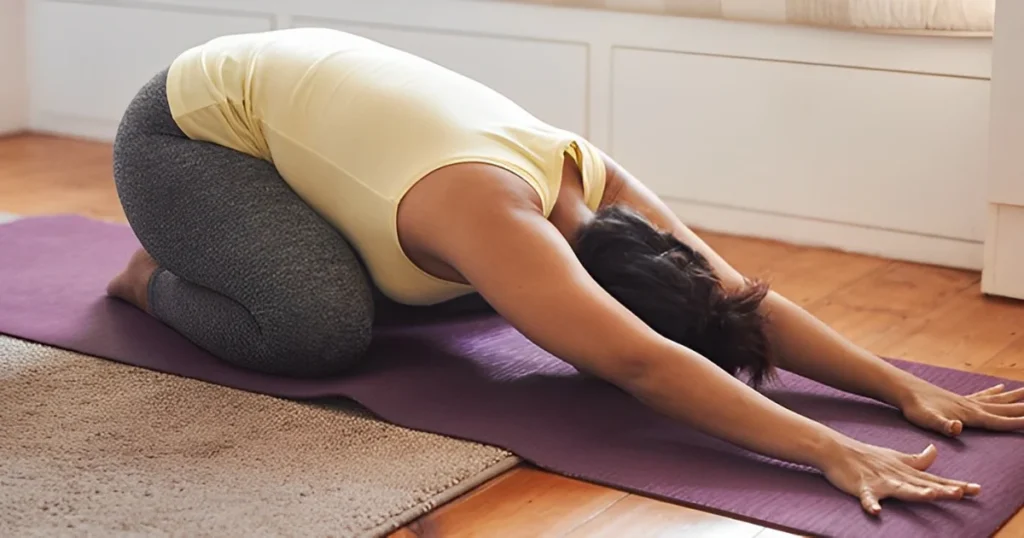Yoga therapy helps mental health; yes, this is true. It is a fantastic type of treatment for all levels of practitioners, including beginners.
Yoga Therapy Helps Mental Health: Know more

It is the PB & J of workouts; it is the perfect combo. And you may exercise your body and mind simultaneously by combining exercise and meditation. It is a natural way to pump up the volume of your serotonin production. Some research suggests this can help ease depression symptoms.
Here is how yoga therapy and mental health can make you feel better inside and out.
Yoga therapy helps mental health in many ways. Research reveals that meditation provides advantages for mental health since it helps calm the mind and helps thoughts flow more slowly.
The same equipment is used in yoga therapy as in other types of yoga. Only the requirements of each individual are given more attention. The practice can help you address your physical, emotional, or mental concerns. Yoga therapy can help with the following:
- Mind-body connection
- Overall well-being
- Physical pain
- Depression
- Anxiety
- Stress
How is it different from regular yoga?

Traditional yoga and yoga therapy can be super soothing and beneficial, but the two have some differences. Again, it comes down to individual results. The techniques and routines of yoga will be the main focus of a conventional yoga instructor.
These courses frequently cater to a broad audience. But, with yoga therapy, the therapist will pay close attention to your unique mental and physical requirements. So, yoga therapy and mental health are vital. You can check top fitness exercises.
Before a session, a yoga therapist will evaluate your needs to personalize your experience. They will also go over different healing tools, like:
- Yoga postures
- Guided energy work
- Meditation techniques
- Breathe awareness and control
The therapist will choose the right balance of these tools based on your needs. Of course, you can also get guidance on practicing yoga independently from a yoga therapist.
Importance of Yoga Therapy
-
Stress reduction
Life is often a stress fest, and yoga therapy is made to help you. You can maintain your composure, focus, and optimism with regular practice. Compared to women who did not practice yoga, those who did it once or twice a week for three months. They experienced higher reductions in stress and improvements in quality of life.
-
Anxiety relief
Yoga therapy helps mental health by reducing stress. As a result, many people turn to yoga to reduce anxiety. And with good reason! Calming sensations, concentrated breathing, and gradual movements can reduce anxiety levels.
According to a study, compared to a control group of 31 women, the 34 women referred to a yoga clinic for anxiety practiced yoga twice a week for two months. After that, the yoga group displayed more significant anxiety reductions than the control group.
-
Improved eating habits
Medication and yoga encourage mindfulness, and some research suggests that mindfulness can contribute to healthier eating habits and overall lifestyle improvements. In addition, yoga may support you in developing a more beneficial relationship with food and your body, which is why it is frequently utilized in the recovery from eating disorders.
-
Better mood
Having a bad day is OK. It happens. You can stop those negative feelings in their tracks with yoga therapy. You’ll feel a helluva lot better and be able to kill those endorphins. This is the importance of yoga therapy.
Does yoga therapy help depression?

Everyone who suffers from depression may feel alone and distant. But always remember you are not alone. In the United States, depression affects over 17.3 million adults each year. According to studies, yoga may improve your health. Energy levels and concentration levels can suffer from depression.
Yoga could provide you with the boost you need to resume your work. In addition, yoga can be beneficial chemically because it lowers cortisol levels, which are connected to sadness and the stress hormone cortisol.
Can regular yoga be used as a kind of therapy?
Yes! Yoga has therapeutic applications. But remember that it is not a miracle treatment. Yoga therapy might not replace the effects of other treatments, but it is worth a shot. Combining this with additional therapies may be the most effective strategy.
Advantages of yoga therapy
- It helps you establish goals
- Friendly for all fitness levels
- Can improve the overall health
- Works out your mind and body
- Can reduce stress and anxiety
- Can ease symptoms of depression
Disadvantages of Yoga Therapy
- Not the right fit for everyone
- Perhaps difficult on a bodily and emotional level
- Depending on the studio or therapist, it can be expensive.
Yoga benefits you may not be aware of:
A healthy spine
In a study, the spine scans of yoga instructors were contrasted with those of non-yogi subjects. The spines of the yogis were more robust and suffered from less disc degeneration.
Focus and cognitive health
Want to improve focus, speed up your brain’s processing skills and boost your cognitive function? Just unfold your mat and suggests this 2015 evaluation of the available research.
More energy
Yoga therapy helps mental health by giving you energy. Yoga can have comparable effects to other power poses. For example, it can aid in increasing or maintaining bone density. A mere 2 minutes will suffice.
Weight loss
While other types of exercise can burn more calories, yoga can help with loss- even when it is restorative. Researchers believe it is likely due to yoga’s ability to reduce cortisol, one of your stress hormones.
Better sleep
More than half of natural yogis who responded to a study said the practice helps them sleep better.
Stronger bones
Yoga is weight-bearing yet low-impact. Therefore it can aid in increasing or maintaining bone density.
Better balance
Falls are a significant health risk for aging adults, but yoga can help you steady on your feet. The exercise strengthens your feet and ankles and makes you more conscious of your body’s position and surroundings, giving you greater control over your posture and balance.
Relief for back and neck pain
In a study of many patients, yoga has been shown to offer short-term relief for pain in both the back and neck.
Healthy knees
Growing older does not have to be accompanied by knee pain and stiffness. Yoga has been proven to reduce knee pain and awkward and irritating morning stiffness in people with osteoarthritis.
A strong heart
Yoga therapy helps mental health by building a solid core. For the ones at a higher risk of developing cardiovascular disease or metabolic syndrome, yoga can help. In addition, blood pressure, cholesterol, and body mass index all improved due to the practice.




